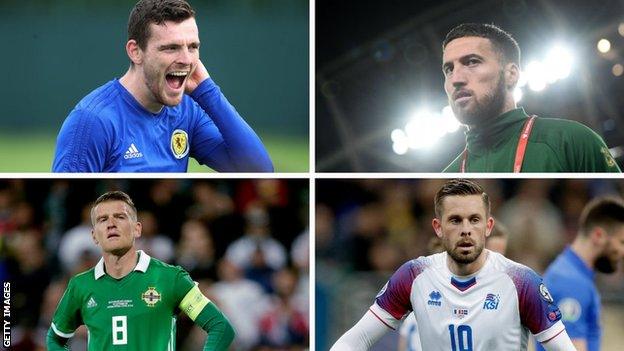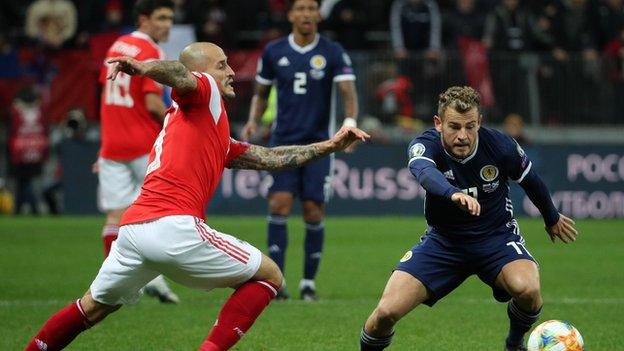Euro 2020 play-offs: Everything you need to know about final qualifiers
- Published

Scotland's Andy Robertson, the Republic of Ireland's Matt Doherty, Northern Ireland's Steven Davis and Iceland's Gylfi Sigurdsson are among the players aiming to lead their countries to Euro 2020
The final four Euro 2020 spots are set to be decided when the play-offs take place on 8 October and 12 November.
Scotland, Northern Ireland and the Republic of Ireland are among the 16 teams battling for places.
How does it all work? First let's start by looking at who is in it...
The semi-final fixtures
All the eight semi-final games are on Thursday, 8 October, with the four finals on 12 November (both before Nations League double headers). They were initially scheduled for 26 and 31 March before the coronavirus pandemic.
All kick-off times are at 19:45 BST unless otherwise stated.
Path A
*Bulgaria v Hungary
Iceland v Romania
Path B
*Bosnia-Herzegovina v Northern Ireland
Slovakia v Republic of Ireland
Path C
*Norway v Serbia
Scotland v Israel
Path D
*Georgia v Belarus (17:00)
North Macedonia v Kosovo
*denotes winner of this tie will host final
How did these teams qualify for play-offs?
The inaugural Nations League in 2018 provided all 16 Euro 2020 play-off spots.
The winners of each group were guaranteed a play-off place, and if they qualified through the standard European Championship qualifiers, the next ranked team in their Nations League tier got the place.
With most of the big nations qualifying automatically, it meant every team in the top two tiers - and about half of Tier C teams - plus the top four Tier D sides all qualified.
How do the play-offs work?
The 16 teams are in four different paths, mostly based on which Nations League tier they were in. However with all bar one of the Tier A sides qualifying automatically - Iceland - three teams from Tier C were drawn at random to take part in those play-offs alongside them.
The winner of each semi-final will go on to play in the finals, also one-legged, during the next international break against the winner of the other game in their path. The winners of that game go to Euro 2020.
The home team in each semi-final tie was picked based on who finished higher in the Nations League - but the hosts for each final were drawn at random.
What to look out for
A potential Northern Ireland-Republic of Ireland final - which would be at Belfast's Windsor Park - is likely to be a big talking point, although they both have to get through tricky away games before they worry about that.
Both sides have new managers. Michael O'Neill and Mick McCarthy would have taken charge of the games in March - but now Ian Baraclough and Steven Kenny, who were both the under-21 coaches, are the senior bosses.
Northern Ireland and the Republic both qualified for the play-offs purely on the basis of being in Tier B of the Nations League. Both sides finished bottom after failing to win a game.

Newcastle winger Ryan Fraser is in the Scotland squad to face Israel
However Scotland, who host Israel, qualified on their own merits after topping their Nations League group.
They are bidding to qualify for their first tournament since the 1998 World Cup. Their only two European Championships have been in 1992 and 1996, going out in the group stage both times.
Israel have changed manager since March, with Willibald Ruttensteiner replacing fellow Austrian Andreas Herzog.
If Scotland overcome Israel and reach the final they could then face one of Europe's most in-form strikers. Erling Braut Haaland is likely to stand in their way should Norway beat Serbia - the 20-year-old scored 44 goals in 40 games last season and has begun this year's Bundesliga campaign with four goals in three games.
If it is Serbia then Scotland will likely face Aleksandar Mitrovic, the joint top scorer in the Championship with Fulham last season.
There will be a European Championship debutant from Path D. The format of the Nations League meant one team from the bottom tier was guaranteed a Euro 2020 place.
Georgia and Belarus joined Fifa in 1992 after the break-up of the Soviet Union, North Macedonia joined in 1994 after the break-up of Yugoslavia and Kosovo only became a member in 2016 after leaving Serbia.
None of those countries have ever qualified for a major tournament since independence. They are all ranked between 66th and 116th in the Fifa world rankings.
Will fans will be allowed?
Uefa has said home fans - but no away supporters - can occupy up to 30% percent of the ground's capacity if local authorities allow.
That means 2,000 Bosnian fans will be allowed to attend their semi-final against Northern Ireland.
But Scotland's home game with Israel will be behind closed doors because the government is not allowing spectators into matches.
Slovakia has declared a state of emergency, meaning fans are unlikely to be allowed into their game with the Republic of Ireland.
Which groups will they be in?
Northern Ireland and the Republic of Ireland know they will be in Group E of Euro 2020 with Spain, Poland and Sweden if they qualify - with two games in Dublin. Slovakia or Bosnia-Herzegovina would also go into the group if they win the play-off.
Scotland would be in Group D with England, Croatia and the Czech Republic if they win - with two home games at Hampden Park. Israel, Norway or Serbia would go into this group if they win.
As a host country, if Romania win the play-offs, they will go into Group C with Ukraine, the Netherlands and Austria. But if they do not then Georgia, North Macedonia, Kosovo or Belarus - the Path D sides - would go into that group instead.
If Iceland, Bulgaria or hosts Hungary win the Path A play-offs, they will go into Group F with Germany, France and Portugal. But if Romania win, that is the group the Path D team will be in.

Football X Music playlist: Listen to your team's curated pre-match tracks
Freddie Flintoff: England star talks to Headliners about his battle with bulimia
